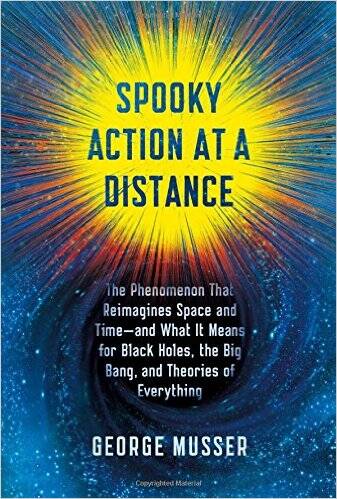Most of us, most of the time, don’t fret about the foundations of empirical science. We’re grateful that it works and rather naively believe that science can answer any question. If not today, then soon enough. That confidence conceals a mistake, made by many. Science is a method, not an acting agent. Science doesn’t work, and science doesn’t answer questions. People do, using science.
It’s helpful, however, to note how our contemporaries insert the term “science” where once they might have used the words “God” or “nature.” Same sleight of hand. God and nature aren’t agents either, at least not in this world. Nature is a pattern we perceive. It doesn’t “do” anything. And, on this side of the grave, even “God,” –for us at least—is more a way of approaching the world than an actor, or agent, within the world.
But since most of us aren’t worried about the foundations of empirical science, we might not be all that disturbed by Spooky Action at a Distance, a new book by George Musser, a contributing editor of Scientific American magazine (2015). The title is taken from Albert Einstein, and here is how Musser first introduces the problem.
Enough of science. Let us pass to God and the Gospel, first noting that the foundations of science, or lack of them, do not prove the existence of God. “If science can’t explain its very self, then God must exist,” is an assertion that accomplishes nothing. The non-believer hasn’t been given an answer to the problem of foundations, and the believer has done no more than to assert that the answer has a name, which is God. But a name without a profile has no real identity. It’s not an actor in the world.
No, you don’t fall into the Gospel by way of scientific holes, black holes in space or philosophical ones. It’s the heart that trips you up. See the great sorrow of a mother burying her child; acknowledge it as the unbearable annihilation of the deepest bond, which two humans can share. Then you’re ready to hear the call of the Gospel and to comprehend its claim on our lives.
When Elijah restores breath to the widow’s son, the skeptic might argue that the boy was only on the brink of death. Saint Luke, however, is clearly claiming that Christ restores a son, who was dead, to a grieving mother. The love of mother and child, received into the arms of the savior, is stronger than death.
In either case, we don’t have a scientific explanation for what happened. Theories can be proposed, but, as none can be falsified so, none can be accepted. That’s the way science works: what can’t be ruled out can’t be ruled in. On the other hand, lack of a scientific answer doesn’t mean that something didn’t happen. It means that we lack an explanation for it. Put another way, to say that Christ didn’t raise the widow’s son has no more scientific merit than to say that he did.
The question of scientific proof for a question of history is a dead end. You can hypothesize about the past, but you cannot experiment with the past. But follow the road opened by revelation itself, and read the signpost in a Gospel key: love is stronger than death. A dead boy is restored to his mother. The Gospel is teaching is that relationship is the most fundamental realm of reality, deeper than time or space. Fascinating, that the Gospel assertion parallels science itself. Relationship is the most fundamental realm of reality, deeper than time or space.
Distance and decay, death itself, cannot conquer life and its love. That’s pure Gospel. Something science will never prove, because those of us who have lived and loved know that we can’t be explained away by science. Science isn’t our master. It’s only a method.
1 Kings 17: 17-24 Galatians 1:11-14a, 15ac, 16a, 17, 19 Luke 7: 11-17








